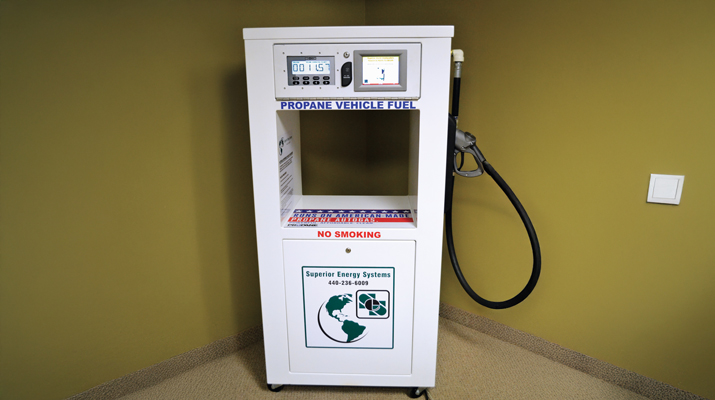A bright future for autogas
Joe Thompson, president of Roush CleanTech, is a member of the Roush Enterprise Steering Committee and resides on two energy boards. Here he shares a guest commentary:
These are exciting times for companies dedicated to dressing up the green portfolio in their fleet vehicles.
Automotive companies are racing to develop the best clean fuel product. And propane marketers stand to gain the most when it comes to promoting their own fuel (autogas) because of its uncompromising benefits – readily available, environmentally responsible, domestically produced; all of this with significant fuel and maintenance cost reductions.
Why autogas?
Fleets are taking notice of the powerful package propane autogas has to offer.
Propane autogas gets the job done by burning cleaner than gasoline, with up to 20 percent less nitrogen oxide, up to 60 percent less carbon monoxide, 18 percent fewer greenhouse gas emissions and fewer particulate emissions, including 87 percent fewer smog-producing hydrocarbons and 50 percent fewer toxins and other smog-producing emissions.
Propane autogas has the largest refueling infrastructure of any alternative fuel, with availability in every state. With its high energy density, vehicles go farther on a tank of propane fuel than most other alternative fuels. And we all know how safe the fueling tanks are – 20 times more puncture resistant compared to gasoline vehicles.
As if it couldn’t get any better, propane autogas just makes economic sense by banking a lower cost-per-mile versus other fuels; potentially extending engine life with low carbon and oil contamination characteristics; and shortening maintenance schedules. Additionally, propane is projected to cost between 30 and 60 cents less per gallon than gasoline for the next 25 years.
Product offerings
In addition to the ability to retrofit any existing vehicle, the number of dedicated propane autogas vehicle models available to fleets has grown to include even more pickup trucks, vans, shuttles and school buses.
Just this summer, Roush CleanTech unveiled plans to develop a Ford F-650 6.8-liter 3V liquid propane autogas fuel system, which will create a new generation of medium-duty propane autogas bobtail and delivery trucks (33,000 GVWR) typically powered by diesel engines.
It’s never been easier for propane companies to power their fleets with the fuel they sell or to help promote the fuel they sell to the customers they already serve.
Stamp of approval
Propane autogas is more than a theory. There are 15 million vehicles operating on propane autogas worldwide.
Propane distribution leaders such as AmeriGas, Ferrellgas, Heritage Propane and Kamps Propane – just to name a few – have recognized it as the right fuel to use in their own delivery vehicles.
NASCAR took it for a drive over its 2010-11 season, and a whole host of prominent companies have added Roush CleanTech propane autogas vehicles to their fleets, including Frito-Lay, Time Warner Cable, ThyssenKrupp Elevator and SuperShuttle. Many parks, including Denali National Park, are using or plan to use autogas to help keep their nature reserves clean.
These partnerships demonstrate the validity of propane autogas and position propane as a domestic solution that is versatile enough for both inside and outside of the home for uncompromised performance and exceptional reliability.
Now is the time
Now is the time to fully embrace what propane as an engine fuel has to offer – and promote the heck out of it.
Adoption of the fuel you sell into your own fleet is the first step. Propane autogas fuel systems are more reliable, better equipped and more readily available for different engine applications today than ever before. Find an application that works for you and start reducing your own propane company’s dependence on foreign oil.
Education is the next step. Share propane’s environmental and economic benefits with customers who are already calling on you to warm their buildings, barbeque hotdogs or power their off-road equipment. Show how propane autogas can work in their fleet applications to reduce operating costs. Roush CleanTech offers an interactive fuel savings calculator on our website; I encourage you to give it a try by visiting roushcleantech.com.
In addition to having autogas information on your own website, send your customers to the Propane Education & Research Council and the Energy Department’s Alternative Fuels Data Center sites (autogasusa.org and afdc.energy.gov, respectively). Network with managers looking for green solutions in the fuel tank and put them in touch with a propane autogas OEM partner. Be the supportive link when it comes time to install on-site fueling infrastructure for adoptees.
The future is bright for propane autogas. Propane marketers have a solid product to share with customers looking to incorporate alternative engine fuels into their lineup of environmentally friendly practices. Slip on your shades and hit the pavement with an attitude of excitement, knowing you have an alternative fuel winner in your back pocket.
















